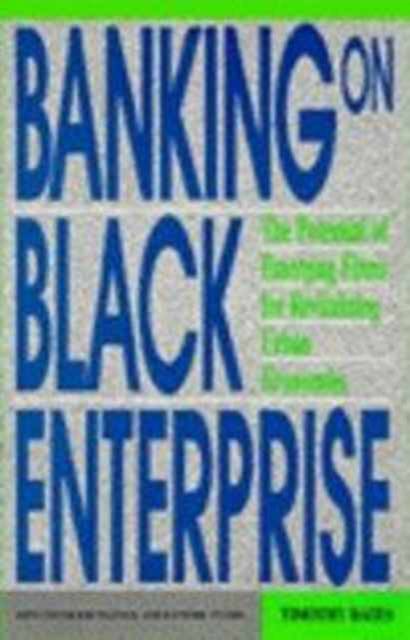
- Afhalen na 1 uur in een winkel met voorraad
- Gratis thuislevering in België vanaf € 30
- Ruim aanbod met 7 miljoen producten
- Afhalen na 1 uur in een winkel met voorraad
- Gratis thuislevering in België vanaf € 30
- Ruim aanbod met 7 miljoen producten
Zoeken
Banking on Black Enterprise
The Potential of Emerging Firms for Revitalizing Urban Economies
Timothy Bates
Paperback | Engels
€ 64,45
+ 128 punten
Omschrijving
Since the 1960s, black businesses have been diversifying and expanding in response to increases in entrepreneurial talent and investment capital. Opportunities created by policies such as procurement set-aside programs have induced better educated, younger blacks to create and expand firms in new lines of business, including wholesaling, contracting, and skill-intensive services. Bates argues that targeting assistance toward these emerging small businesses could go far toward halting the chronic drain of capital and skills suffered by our nation's inner cities. For the research in this book, Bates has been quoted most recently in The Economist and, twice, in The Wall Street Journal, whose editors described him as 'the reigning expert on minority business.' In 1993 Banking was cited in Congressional hearings for its evidence of the positive impact that greater investment in minority-owned firms could have on inner-city poverty.
Specificaties
Betrokkenen
- Auteur(s):
- Uitgeverij:
Inhoud
- Aantal bladzijden:
- 190
- Taal:
- Engels
Eigenschappen
- Productcode (EAN):
- 9780941410946
- Verschijningsdatum:
- 31/03/1993
- Uitvoering:
- Paperback
- Formaat:
- Trade paperback (VS)
- Afmetingen:
- 148 mm x 228 mm
- Gewicht:
- 231 g

Alleen bij Standaard Boekhandel
+ 128 punten op je klantenkaart van Standaard Boekhandel
Beoordelingen
We publiceren alleen reviews die voldoen aan de voorwaarden voor reviews. Bekijk onze voorwaarden voor reviews.











